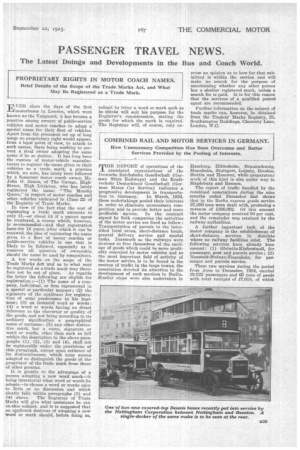PASSENGER TRAVEL NEWS.
Page 23

If you've noticed an error in this article please click here to report it so we can fix it.
The Latest Doings and Developments in the Bus and Coach World.
PROPRIETARY RIGHTS IN MOTOR COACH NAMES.
i Brief Details of the Scope of the Trade Marks Act, and What May Be Registered as a Trade Mark.
EITER since the days of the first motorbuses in London, which were known as the Vanguard, it has become a practice among owners of public-service vehicles and motor coaches to adopt especial name for their fleet of vehicles. Apart from the precedent set up of long usage no proprietary right would appear, from a legal point of view, to attach to such names, there being nothing to prevent a rival owner adopting the same name if he so desires. It has long been the custom of motor-vehicle manufacturers to register the name given to their vehicles as a trade mark, a practice which, we note, has lately been followed by a Somerset motor coach owner. Mr. John G. James, of The Garage, HighStreet, High Littleton, who has lately' registered the name, "The Mendip Queen," in respect of motor coaches and other vehicles embraced in Class 22 of the Registry of Trade Marks.
In view of the fact that the cost of registering a trade mark amounts to only fl—or about £4 if a patent agent be employed, a course which, however, is recommended—and that registration lasts for 14 years, after which it can be renewed, the idea of registering the name given to a fleet of motor coaches or public-service vehicles is one that is likely to be followed, especially as it removes all question of ownership should the name be used by competitors.
• A few words on the scope of the Trade Marks Act and as to what may be registered as a trade mark may therefore not be out of place. As regards the latter the following are eligible for registration :—(1) The name of a company, individual, or firm represented in a special or particular manner ; (2) the s;gnature of the applicant for registration of some predecessor in his business; (3) an invented word or words ; '(4) a word or words having no direct reference to the character or quality of the goods, and not being according to its ordinary signification a geographical name or surname ; (5) any other distinctive mark, but a name, signature or word or words, other than such as fall within the description in the above paragraphs (1), (2), (3) and (4), shall not be registerable under the provisions of this paragraph, except upon evidence of its distinctiveness, which term MPAris adapted to distinguish the goods of the proprietor of the trade mark from those of other persons.
It is greatly to the advantage of a person adopting a new word mark—it being immaterial what word or words he adopts—to choose a word or words mieu to little or no discussion and which clearly falls within paragraphs (2) and (4) above. The Registrar of Trade Marks will give what assistance he can on this subject, and it is suggested that an applicant desirous of adopting a new word or mark should, before doing so, submit by letter a word or mark such as he thinks will suit his purpose for the Registrar's consideration, stating the goods for which the mark is required. The Registrar will, of course, only ex press an opinion as to how far that submitted is within the section and will make no search for the purpose of ascertaining whether any other person has a similar registered mark, unless a search fee is paid. It is for this reason that the services of a qualified patent agent are recommended.
Further information on the subject of trade marks can, however, be obtained from the Traders' Marks Registry, 25, Southampton Buildings, Chancery Lane, London,IV.O.




























